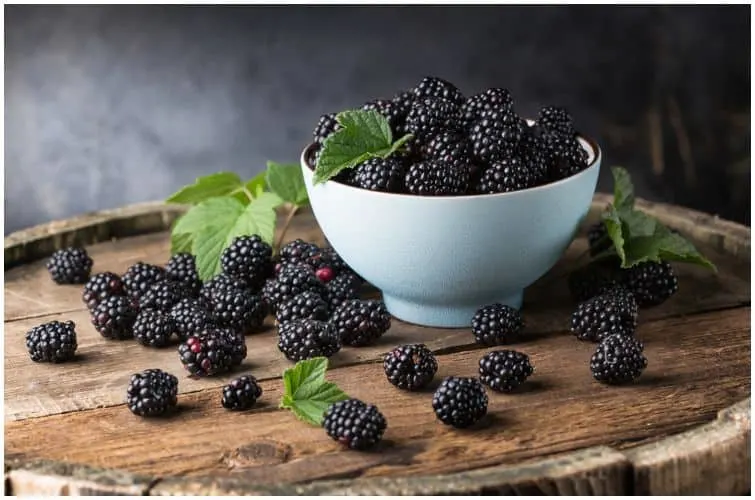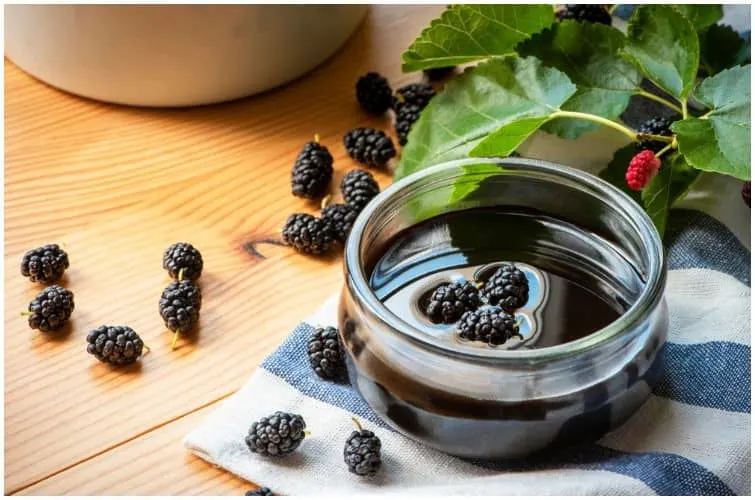This article reveals the differences between mulberry and blackberry:
Mulberry
Mulberry is a berry of the Morus alba tree.
The mulberry tree belongs to the Moraceae family and is closely related to breadfruit, figs, and banyan.
The use of mulberry leaves in traditional Chinese medicine was first recorded in around 500 AD in the ”Divine Husbandman’s Classic of the Materia Medica.”
Blackberry
It is a versatile fruit that belongs to the Rubus genus in the Rosaceae family, which also includes dewberry and raspberry.
This fruit grows naturally throughout much of the US and was a favorite food of early European settlers.
Nutrition Facts
1 cup (140g) of raw mulberries contains:
- 60 calories;
- 2.4g Fiber – 10% daily value;
- 2g Protein – 4% DV;
- 35 IU Vitamin A – 1% DV;
- 51mg Vitamin C – 85% DV;
- 1.2 mg Vitamin E – 6% DV;
- 10.9mcg Vitamin K – 14% DV;
- 0.0mg Thiamin – 3% DV;
- 0.1mg Riboflavin – 8% DV;
- 0.9mg Niacin – 4% DV;
- 0.1mg Vitamin B6 – 4% DV;
- 8mcg Folate – 2% DV;
- 0.2mg Pantothenic Acid – 2% DV;
- 17.2mg Choline;
- 55mg Calcium – 5% DV;
- 2.6mg Iron – 14% DV;
- 25mg Magnesium – 6% DV;
- 53mg Phosphorus – 5% DV;
- 272mg Potassium – 8% DV;
- 14mg Sodium – 1% DV;
- 0.2mg Zinc – 1% DV;
- 0.1mg Copper – 4% DV;
- 0.8mcg Selenium – 1% DV.
1 cup (144g) of raw blackberries contains:
- 62 calories;
- 7.6g Fiber – 31% daily value;
- 2g Protein – 4% DV;
- 308IU Vitamin A – 6% DV;
- 30.2mg Vitamin C – 50% DV;
- 1.7 mg Vitamin E – 8% DV;
- 28.5mcg Vitamin K – 36% DV;
- 0.0mg Thiamin – 2% DV;
- 0.0mg Riboflavin – 2% DV;
- 0.9mg Niacin – 5% DV;
- 0.0mg Vitamin B6 – 2% DV;
- 36mcg Folate – 9% DV;
- 0.4mg Pantothenic Acid – 4% DV;
- 12.2mg Choline;
- 42mg Calcium – 8% DV;
- 0.9mg Iron – 5% DV;
- 29mg Magnesium – 7% DV;
- 32mg Phosphorus – 3% DV;
- 233mg Potassium – 7% DV;
- 0.8mg Zinc – 5% DV;
- 0.9mg Manganese – 47% DV;
- 0.2mg Copper – 12% DV;
- 0.6mcg Selenium – 1% DV.
Health Benefits
Mulberry
Resveratrol
These berries are rich in resveratrol, an antioxidant that, according to a study issued by the University of Texas Health Science Center, has positive effects on longevity and age.
Resveratrol might also help to reduce low-density lipoprotein cholesterol (the “bad” cholesterol), prevent damage to blood vessels, and prevent blood clots.
Vitamin C
Vitamin C is a vital vitamin that plays numerous roles in the chemistry of the human body.
For instance, it helps to increase the absorption of iron from the intestines.
Moreover, vitamin C is required for the production of collagen, an important protein that is a constituent of the body’s connective tissue.
Symptoms of vitamin C deficiency include:
- easy bruising;
- scaly skin;
- anemia;
- gum disease;
- scurvy which includes fatigue.
1 cup of mulberries has 51 mg of vitamin C that is about 85% of the daily recommended intake.
Iron
Iron is a chemical element that is found in all living organisms.
It is very important in maintaining a variety of body functions, including the production of the molecule in your blood which transports oxygen, called – hemoglobin.
Moreover, iron plays an essential role in enzyme reactions, chemical signaling, and the synthesis of new DNA.
Symptoms of mild iron deficiency include:
- decreased immunity;
- unstable body temperature;
- poor appetite;
- decreased mental performance;
- shortness of breath;
- tiredness.
1 cup of mulberries has 2.6 mg of iron which is approximately 14% of the daily recommended intake.
Note – vitamin C increases non-heme iron (the iron found in plants) absorption.
Vitamin E
Vitamin E is a great multipurpose health defender that is best known as an antioxidant.
In addition, it offers many other health benefits, including:
- protecting against cancer and heart problems;
- sustaining healthy blood flow;
- boosting immune system response;
- protecting against cell damage and infection.
Moreover, vitamin E may alleviate fatigue as well as helps to strengthen the capillary walls.
1 cup of mulberries has 1.2 mg of vitamin E which is approximately 6 percent of the daily recommended intake.
ALSO READ: Couscous vs Quinoa
Blackberry
Manganese
Manganese is a trace mineral that is considered an essential nutrient since the human body requires it to function healthily.
It helps your skin produce new collagen to allow for healing after injury.
Also, this mineral helps fight the aging process by protecting the cells from free radical damage.
Manganese has also been reported to improve thyroid function and reduce heavy menstrual flows.
Manganese deficiency had been linked to:
- osteoporosis;
- infertility;
- tremors;
- bone malformation;
- tooth-grinding;
- rapid pulse;
- weakness;
- profuse perspiration;
- pancreatic damage;
- seizures;
- muscle contractions;
- memory loss;
- atherosclerosis;
- irritability;
- hypertension;
- high LDL and total cholesterol levels;
- heart disorders;
- confusion;
- hearing problems;
- eye problems;
- convulsions.
1 cup of blackberries has 0.9 mg of manganese which is approximately 47 percent of the daily recommended intake.
Anthocyanins
Blackberries are a rich source of anthocyanins – water-soluble vacuolar pigments and strong antioxidants that give these berries their deep purple color.
Anthocyanins can fight against oxidative damage – something which is known to contribute to memory impairment and brain aging.
Moreover, blackberries contain ellagic acid, another antioxidant known for its capacity to protect skin from ultraviolet damage.
ALSO READ: Quercetin Side Effects
Vitamin K
Vitamin K is a fat-soluble vitamin that is required for the blood to clot, an essential process that prevents excessive bleeding when a blood vessel is injured.
Symptoms of vitamin K deficiency include:
- increased prothrombin time;
- easy bruising;
- blood in stool;
- blood in the urine;
- bleeding from the gastrointestinal tract;
- heavy menstrual periods;
- excessive bleeding from punctures, wounds, or surgical sites;
- oozing from gums or nose.
1 cup of blackberries has 28.5 mg of vitamin K that is about 36 percent of the daily recommended intake.
Fiber
Dietary fiber is the indigestible part of plant-based foods that travels through the gut and helps manage waste and digestion.
According to research, individuals who added more dietary fiber to their regular nutrition lost almost as much weight as individuals who followed the low-fat eating plan suggested by the American Heart Association.
1 cup of blackberries has 7.6 grams of dietary fiber which is about 31 percent of the daily recommended intake.
ALSO READ: Malabar Spinach – Health Benefits
Mulberry vs Blackberry – Taste
Mulberries have a mildly sweet flavor which is similar in taste to dried figs and goji berries.
On the other hand, blackberries have a sweet, juicy taste which is similar to raspberries. But, if they are not completely ripe, blackberries may taste tart, kind of sour, or slightly bitter.
When it comes to nutritional value, both mulberries and blackberries are good sources of fiber and vitamins C and K. However, mulberries contain more vitamin C than blackberries.
Sources https://www.ncbi.nlm.nih.gov/pmc/articles/PMC2935155/ https://www.ncbi.nlm.nih.gov/pmc/articles/PMC4127818/ https://www.tandfonline.com/doi/abs/10.1080/01496395.2013.862546 https://www.hindawi.com/journals/ecam/2012/263520/

